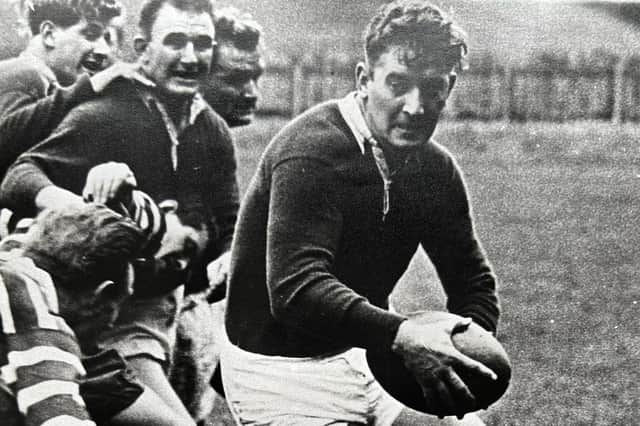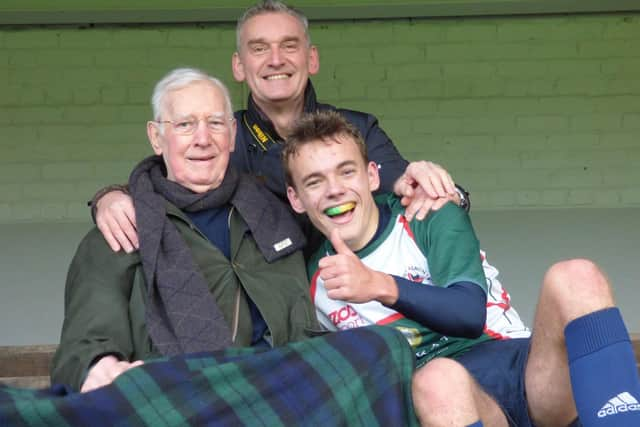Borders rugby fans in mourning for ex-Scottish international Oliver Grant following death at age of 88


Grant was capped six times for his country, making his first three appearances during the 1960/61 season, his first in Dublin as a late replacement for the injured Frans Ten Bos, playing his part in a 6-5 win. Afterwards, his friend and team-mate Hugh McLeod ran the length of the pitch to retrieve the match ball for him, presenting it in the dressing room with the immortal words: “I’ve been coming here for eight years and couldn’t buy a win and you, you bugger, do it on your first shot.”
Though primarily a No 8, his second international appearance was also playing second-row during the 1960 Five Nations, a 21-12 loss to England at Murrayfield in Edinburgh.
Advertisement
Hide AdAdvertisement
Hide AdHe was then selected for the first short tour of its kind, a trip to South Africa, where he played the test match, packing down against Doug Hopwood, a man whose trademark No 8 pick-up he greatly admired and which he would adopt, adapt and use to great effect throughout his career. Scotland put in a tenacious display, losing 18-10 to the Springboks in Port Elizabeth.


Grant then fell out of favour with the national team’s selectors until the 1963/64 season, when, following a tremendous performance against Wilson Whineray’s All Blacks for the South of Scotland, losing 8-0, he roared back into the reckoning. He was one of nine Hawick players in that district side, six of them in the pack.
He won his place back in the Scottish side to face France, winning that game 10-0, and the following month he retained his place as Scotland took on the All Blacks, playing his part in an inspired and ferocious pack performance as they held their visitors to a scoreless draw at Murrayfield.
His final cap was against Wales that season, an 11-3 defeat at Cardiff Arms Park.
Advertisement
Hide AdAdvertisement
Hide AdHe was selected for the Barbarians’ Easter tour in 1962, playing against Cardiff and Newport and scoring a try against the latter.
Grant was considered unlucky to miss out on selection for the 1962 British Lions tour to South Africa as many in the rugby press thought his style of play and experience of touring in South Africa early in his career would stand the tourists in good stead. Alas it wasn’t to be.
A regular fixture in the South district pack from the late 1950s to the mid-1960s, Grant played his part in several championship-winning squads, together with many of his Hawick team-mates from that era, many of whom also went on to represent their country, most notably his brother Derrick, Adam Robson, McLeod, Billy Hunter, Jack Hegarty and Norman Suddon.
However, it was while playing for his beloved Hawick that Grant truly excelled. After cutting his teeth with the ATC semi-junior side and Hawick YM, he played his first game for the Robbie Dyes in 1954, a victory against Langholm. Going on to make more than 200 appearances for the Greens, his try-scoring record from the back row was outstanding.
Advertisement
Hide AdAdvertisement
Hide AdPlaying alongside elder brother Jack early in his career and then younger brother Derrick, Grant made the No 8 jersey his own, becoming a crucial part of the all-conquering Greens squad of the early 1960s that, captained by Hegarty, won the unofficial Scottish championship and Border League, going on to become the dominant force in Scottish club rugby for much of the 1960s.
He was also part of a Hawick sevens side which came within a hair’s breadth of wresting the Middlesex Sevens crown from London Scottish in 1963, coming back from a three-try deficit in the final only to fall agonisingly short with the last play of the tie at London’s Twickenham Stadium.
Work commitments took Grant south to North Yorkshire in 1965 and, upon hearing he was resident in Knaresborough, Harrogate’s committee got in touch to coax him out of semi-retirement as they targeted the Yorkshire cup that season. He duly pulled on his boots again and, as part of a strong squad included Wales hooker Jeff Young, won their way to the final, in which they defeated Wakefield 9-8 at Otley.
During that period, Grant played for Yorkshire on several occasions, an honour he ranked very highly indeed.
Advertisement
Hide AdAdvertisement
Hide AdAfter finally retiring from playing, work commitments took Grant and his family south to London, but the call of the oval ball was never far away and he soon became involved in coaching at London Scottish, remaining involved for over two decades. During his time at the Athletic Ground, he nurtured and coached many talented players, creating a team which regularly challenged at the very top of English club rugby.
With Grant coaching London Scottish and younger brother Derrick taking on the same role at Hawick during this time, their family were partly responsible for creating a conveyor belt of talent for the Scottish Rugby Union to call on.
Grant will long be remembered by the Hawick faithful and by those who played with him and against him as part of a generation of players whose sole purpose was to play for each other and honour the green jersey they wore with pride, and who, through it all, remained humble, grounded family men.
Grant is survived by wife Sally, daughters Vivian and Hannah and son Malcolm.